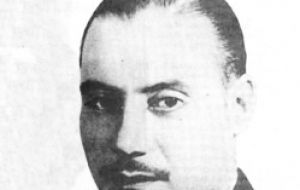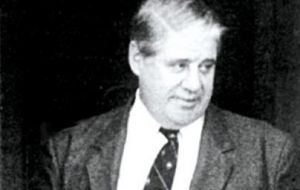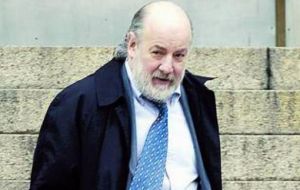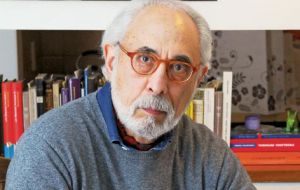MercoPress. South Atlantic News Agency
The New York Times: How Argentina ‘Suicides’ the Truth
 Juan Duarte, older brother of Argentina’s political saint, Eva Perón, committed “suicide” in 1953, nine months after she died at age 33, from cancer.
Juan Duarte, older brother of Argentina’s political saint, Eva Perón, committed “suicide” in 1953, nine months after she died at age 33, from cancer.  Hector Febres, an officer in the Navy Mechanics School death camp during the 1976-83 military dictatorship, was found dead by cyanide poisoning in his cell in 2007.
Hector Febres, an officer in the Navy Mechanics School death camp during the 1976-83 military dictatorship, was found dead by cyanide poisoning in his cell in 2007.  Last month, Judge Bonadío, handling charges against Cristina Fernandez and her hotel business, received a death threat assembled from cutout letters.
Last month, Judge Bonadío, handling charges against Cristina Fernandez and her hotel business, received a death threat assembled from cutout letters.  “Argentina is monotonous, it repeats its tragedies,” says Santiago Kovadloff, a 72-year-old philosopher, who has emerged as the country's moral compass
“Argentina is monotonous, it repeats its tragedies,” says Santiago Kovadloff, a 72-year-old philosopher, who has emerged as the country's moral compass By Uki Goñi - Political “suicides” are so common in Argentina that a special word has been invented for them. Ask different people in Buenos Aires today and they may disagree whether the crusading prosecutor Alberto Nisman was murdered or took his own life. But most everyone will concur that Mr. Nisman was “suicided,” the latest victim of a dark-power centrifuge that with sinister regularity spews out dead bodies in this divided nation.
The historical record does not bode well for clarity in the Nisman case. Juan Duarte, older brother of Argentina’s political saint, Eva Perón, committed “suicide” in 1953, nine months after his sister had thrown the nation into a paroxysm of grief over her own early death, at age 33, from cancer.
Embroiled in corruption scandals and suspected of playing a hand in the smuggling of Nazi funds to Argentina, Mr. Duarte was found, like Mr. Nisman, alone, with a bullet in his head. To this day, historians debate the real cause of Mr. Duarte’s death.
The head-scratching continues over more recent mysterious deaths. Héctor Febres, an officer in charge of the so-called “maternity ward” at the notorious Navy Mechanics School in Buenos Aires that became a death camp for thousands of political prisoners during the 1976-83 military dictatorship, was found dead by cyanide poisoning in his cell in 2007.
An apparent suicide, he was believed by many to have been murdered, to silence him about the human rights crimes for which he was on trial.
The Febres case resonates today. Mr. Nisman died the day before he was to appear before Congress to substantiate his charges against President Cristina Fernández de Kirchner for conspiring with Iran. And the judge who investigated Mr. Febres’s death, Sandra Arroyo Salgado, was married to Mr. Nisman at the time.
Ms. Arroyo Salgado reached the conclusion that Mr. Febres was killed by former comrades who feared he would speak about one of the most heinous of the junta’s crimes: keeping pregnant political prisoners alive until they gave birth, then murdering them, and handing over their babies to “good” military families to raise as their own.
A higher court overturned Judge Arroyo Salgado’s attempt to prosecute the officers she suspected of Mr. Febres’s death. Another unsolved “suicide.”
Sometimes, one death is not enough to cover up the corruption and criminality of Argentina’s shady establishment. The invisible “mechanics” who silence troublesome witnesses have not balked at blowing up entire city blocks. On Nov. 3, 1995, a huge explosion rocked Río Tercero in the central province of Córdoba, killing seven people, injuring hundreds and devastating wide areas of the small city.
The explosion, whose epicenter was a weapons factory, was allegedly designed to cover up missing armaments that the government had secretly sold to Ecuador and Croatia, in violation of international agreements. In 2013, former President Carlos Menem was convicted of the arms smuggling, and last December, four military officers were convicted of the explosion. (Both sentences are pending appeals.)
Intimidation of court officials is routine. Only last month, Judge Claudio Bonadío, handling charges against the president regarding irregularities in a hotel business she owns, received a death threat assembled from cutout letters.
“Argentina is monotonous, it repeats its tragedies,” says Santiago Kovadloff, a 72-year-old philosopher who, in the aftermath of Mr. Nisman’s death, has emerged as the country’s moral compass. “There is a long sequence of evidence that highlights the predominance of heinous crime over legality.”
It was in this context of corruption’s pervading every layer of political life that Mr. Nisman presented his explosive charges against the president in court on Jan. 14. The countless hours of phone intercepts on which they were based revealed a conspiratorial underworld unlike anything a prosecutor had dared reveal before.
The wiretaps included a call from someone close to the president, speaking from inside the presidential palace, allegedly transmitting a secret message to Iran. Mr. Nisman claimed the president planned to shield from prosecution five Iranian suspects charged with the bombing of a Jewish community center in Buenos Aires that left 85 dead in 1994.
In the brief four days that we now know were left to him, Mr. Nisman went on a fearless media blitz, discussing, in his trademark motor-mouth style, a world of government subterfuge that had never been exposed in such detail.
“I know I could get killed over this,” he said, as he gave a whirlwind tour of revelation upon revelation.
The prosecutor was shining light on a corrupt system of secret influences and covert agents across the government. “It’s a structure that is repeated everywhere,” says Mr. Kovadloff.
And then, amid the shock and outrage, Mr. Nisman died. Or was “suicided,” to add a final ingredient of unfathomable mystery to the mix. The effect of all this on Argentina is unlike anything else in recent times. Mr. Nisman was only a prosecutor, but his death is dressed in the awed stupefaction of a Kennedy-level event.
(*) Uki Goñi, a writer and journalist, is the author of “The Real Odessa: Smuggling the Nazis to Perón’s Argentina.”




Top Comments
Disclaimer & comment rules-

-

-

Read all comments“ but his death is dressed in the awed stupefaction of a Kennedy-level event.”
Feb 11th, 2015 - 06:10 am 0Speaking of which... have the NorthAmoans solved that one yet?
(52 years... and counting)
They kill a sitting head of state, a president, the supposed assassin, and then a senator would-be brother, and these morons can't solve it??
Write about that New York Crimes. Mind your own business... or about your city soon becoming a glacier or something relevant and current.
Nasty Argentine history of assassination- the precedent set, I suppose CFK simply felt she is 'entitled' to get rid of the threatening and the “inconvenient ” .
Feb 11th, 2015 - 06:57 am 0@1
Feb 11th, 2015 - 08:01 am 0The author of the article resides in Buenos Aires and is frequently published in The Guardian (respected UK left leaning major newspaper).
Just because he also writes for the NYT doesn't mean he is a New Yorker.
Not everyone is as parochial as you are.
Meanwhile, interesting insight from Kovadloff into the pervasive corruption that has never been eradicated from the Argentine Government.
On and on it continues. No wonder the people copy this behaviour.
The whole society is infected.
Commenting for this story is now closed.
If you have a Facebook account, become a fan and comment on our Facebook Page!